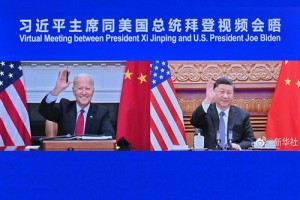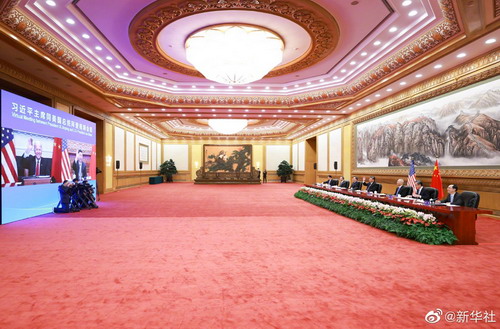
Washington D.C./Beijing: The issue of Taiwan was played up as a major instrument in US-China relationship by Chinese President Xi Jinping in course of the much awaited virtual meeting between him and his American counterpart Joe Biden today morning (Beijing time) at a time when China-US relations have come to a crucial crossroads.
Jinping during the meeting noted the new wave of tensions across the Taiwan Strait, and ascribed the tensions to the repeated attempts by the Taiwan authorities to look for US support for their independence agenda as well as the intention of some Americans to use Taiwan to contain China.
“Such moves are extremely dangerous, just like playing with fire. Whoever plays with fire will get burnt,” he warned. He went on to assert that “China will certainly defend its sovereignty, security and development interests. It is important that the US properly handle the relevant issues with prudence”.
The Chinese President also pointed out that both China and the US are at critical stages of development, and the “global village” of humanity faces multiple challenges.
The Chinese foreign office said Jinping had stated China’s “principled position on the Taiwan question”, since the one-China principle and the three China-US Joint Communiqués “are the political foundation of China-US relations”.

The Chinese side claimed that during the virtual summit, President Biden “reaffirmed” the US government’s long-standing one-China policy, and stated that the US does not support “Taiwan independence”, and expressed the hope for peace and stability to be maintained in the Taiwan Strait. The White House issued a readout of the virtual meeting where it stated that on Taiwan, President Biden underscored that the United States remains committed to the “one China” policy, guided by the Taiwan Relations Act, the three Joint Communiques, and the Six Assurances, and that the United States strongly opposes unilateral efforts to change the status quo or undermine peace and stability across the Taiwan Strait.
Also read: Taiwan’s rulers are deceiving themselves and others, says China
Biden in his opening remarks before the virtual meeting also told Jinping that “If past is prologue, I am sure that today we’ll be discussing those areas where we have concerns — from human rights, to economics, to ensuring a free and open Indo-Pacific”.
The White House later stated that President Biden raised concerns about China’s practices in Xinjiang, Tibet, and Hong Kong, as well as human rights more broadly. He was clear about the need to protect American workers and industries from China’s unfair trade and economic practices. He also discussed the importance of a free and open Indo-Pacific, and communicated the continued determination of the United States to uphold our commitments in the region. President Biden reiterated the importance of freedom of navigation and safe overflight to the region’s prosperity.
Significantly, prior to the virtual summit talks between the two leaders, the United States Secretary of State Antony J. Blinken had spoken about the longstanding U.S. interest in peace and stability across the Taiwan Strait and told the Chinese State Councilor and Foreign Minister Wang Yi on November 12 that the US was concerned about China’s continued military, diplomatic, and economic pressure against Taiwan. Blinken had urged Beijing to engage in meaningful dialogue to resolve cross-Strait issues peacefully and in a manner consistent with the wishes and best interests of the people on Taiwan.
Xinping today reminded Biden that previous US administrations had all made clear commitments on the question of One-China. The Chinese foreign office later explained that the true status quo of the Taiwan question and what lies at the heart of one China were as follows: there is but one China in the world and Taiwan is part of China, and the Government of the People’s Republic of China is the sole legal government representing China. Achieving China’s complete reunification is an aspiration shared by all sons and daughters of the Chinese nation.
“We have patience and will strive for the prospect of peaceful reunification with utmost sincerity and efforts. That said, should the separatist forces for Taiwan independence provoke us, force our hands or even cross the red line, we will be compelled to take resolute measures,” Beijing warned the US.
The meeting between the two presidents opened with Biden making it clear before the virtual talks that it was their responsibility as leaders of China and the United States to ensure that the competition between the two countries “does not veer into conflict, whether intended or unintended. Just simple, straightforward competition”.
He told Jinping that they needed to establish some “commonsense guardrails, to be clear and honest where we disagree, and work together where our interests intersect, especially on vital global issues like climate change”. Biden said none of this was a favour to either of their countries, “but it’s just responsible world leadership. And you’re a major world leader, and so is the United States”. He further told his Chinese counterpart that how the Sino-US bilateral relationship evolves, will have a profound impact not only on both countries but the rest of the world.
Jinping told Biden that China and the United States should respect each other, coexist in peace, and pursue win-win cooperation. He said China and the US needed to uphold the international system with the UN at its core, the international order underpinned by international law, and the basic norms governing international relations based on the purposes and principles of the UN Charter. “Multilateralism without China-US cooperation is incomplete,” he stressed. He further called upon the US not to politicise economic and trade issues between the two countries and asked Washington to “stop abusing or overstretching the concept of national security to suppress Chinese businesses”. He told Biden that the US should be mindful of the spillover effects of its domestic macro policies, and adopt responsible macroeconomic policies.
“We should each run our domestic affairs well and, at the same time, shoulder our share of international responsibilities and work together to advance the noble cause of world peace and development,” Jinping said, and stressed that “a sound and steady China-U.S. relationship is required for advancing our two countries’ respective development and for safeguarding a peaceful and stable international environment, including finding effective responses to global challenges such as climate change, which you referenced, and the COVID pandemic”.
He emphasised that as the world’s two largest economies and permanent members of the U.N. Security Council, China and the United States needed to increase communication and cooperation.
Biden told Jinping that it was important for the China-US relationship to be “open and candid, in terms of our relationship…And I think it’s important we communicate honestly and directly to one another about our priorities and our intentions”.
Chinese foreign office stated that the two sides had thorough and in-depth communication and exchanges on issues of strategic, overarching and fundamental importance shaping the development of China-US relations and on important issues of mutual interest. The two sides also exchanged views on Afghanistan, the Iranian nuclear issue, the situation on the Korean Peninsula, and other international and regional issues of mutual interest.
President Jinping highlighted that a review of the experience and lessons learned in growing China-US relations shows that for the two countries to get along in the new era, three principles must be followed. First, mutual respect. Second, peaceful coexistence. Third, win-win cooperation.
Jinping also identified four priority areas where China and the US should focus their efforts on:
- Shouldering responsibilities of major countries and leading global response to outstanding challenges.
- Acting in the spirit of equality and mutual benefit to move forward exchanges at all levels and in all areas and generate more positive energy for China-US relations.
- Managing differences and sensitive issues in a constructive way to prevent China-US relations from getting derailed or out of control.
- Strengthening coordination and cooperation on major international and regional hotspot issues to provide more public goods to the world.
President Biden said that the US-China relationship is the most important bilateral relations in the world. As two major countries, the US and China have a responsibility to the world as well as to our people. The two sides need to have open and candid dialogues to enhance understanding of each other’s intentions, and make sure that competition between the two countries is fair and healthy and does not veer into conflict. “China has been a major power since 5,000 years ago. The US does not seek to change China’s system, the revitalization of its alliances is not anti-China, and the US has no intention to have a conflict with China,” he was quoted as saying by the Chinese foreign ministry.
Jinping said it is hoped that President Biden will demonstrate political leadership and steer America’s China policy back on the track of reason and pragmatism.
– global bihari bureau





